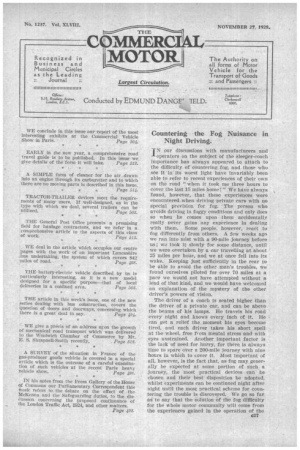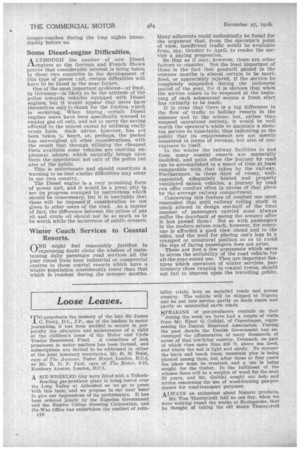Countering -the .Fog Nuisance in Night Driving.
Page 1

Page 2

If you've noticed an error in this article please click here to report it so we can fix it.
TN our discussions With manufacturers and -Loperators on the subject of the sleeper-coach importance has always appeared to attach to the difficulty, Of cmintering fog; and those who see it in its worst light have invariably. been able to refer to recent eXperiences of their own on the road "when it took me three .hours to cover the last 15 miles home!" We' have always found, however, that these experiences were encountered, when driving private cars with no special provision for fog. The person who avoids driving in foggy conditions and only does so when he comes upon them accidentally really never gains any experience in dealing with them. Some people, however, react to fog differently from others. A few weeks ago we ran into mist with a 90-mile journey before us; we tOok it slowly for some distance, until we were overtaken by a car travelling at about 25 miles per hour, and we at once fell into its wake. Keeping just sufficiently in the rear to be able to avoid the other man's troubles, we found ourselves piloted for over 70 miles at a pace we would not have attempted without a lead of that kind, and we would have welcomed an explanation of the mystery of the other driver's powers of vision.
The driver of a coach is seated higher than • the driver of a private car, and can be above the beams of his lamps. He travels his road every night and know's every inch of it. He can get a relief the. moment his eyes become tired, and each driver takes his short spell at the wheel, free from mental stress and with eyes unstrained. Another important factor is the lack of need for hurry, for there, is always time to spare over a 200-mile journey with nine hours in which to cover it. Most important of all, however, is the fact that, as fog may generally be expected at some portion of such a journey, the most practical devices can be chosen and their best disposition be adopted, whilst experiments can be continued night after night until the most practical scheme for countering the trouble is discovered. We go so far, aS to say thatthe SolutiOtt of' the fog difficulty for the whole motor community will come from the experiences gained in the operation of the
sleeper-coaches during the long nights Immediately before us.
Some Diesel-engine Difficulties.
A LTHOl7GH the number of new Diesel ili_engines at the German and French Shows proves that considerable interest is being taken in thes3 two countries in the development of this type of power tuit, certain difficulties will have to be faced in the near future.
One of the most important problems—at least, iq Germany—is likely to be the -attitude of the police towards vehicles equipped with Diesel engines, but it would appear that users have themselves only to thank for the friction which is occurring. When buying certain Diesel engines users have been specifically warned to employ gas oil only, and not to carry the saving effected to the utmost extent by utilizing really crude fuels. Such advice, however, has not been taken to heart, or, perhaps, the pocket has outweighed all other considerations, with the result that through utilizing the cheapest fuels available some vehicles are emitting unpleasant odours, which naturally brings upon them the opprobrium not only of the police but also of the public.
This is unfortunate and should constitute a warning to us that slmilar difficulties may occur in our own country.
The Diesel engine is a very promising form of power unit, and it would be a great pity to see its progress cramped by restrictions which should be unnecessary, but It is inevitable that these will be imposed if consideration be not given to other users of the road. As a matter of fact, the difference between the prices of gas oil and crude oil should not be so much as to be worth while the incurrence of public censure.
Winter Coach Services to Coastal Resorts.
ONE might feel reasonably justified in expressing doubt about the wisdom of maintaining daily passenger road services all the year round from busy industrial or commercial .centres to those coastal resorts which have a winter population considerably lower than that which is resident during the summer months.
Many adherents could undoubtedly be found for the argument that, from the operator's point of view, insufficient traffic would be available from, say, October to April, to render the service a paying proposition.
Be that M it may, however, there are other factors to consider. Not the least important of these is the fact that goodwill "gained in the summer months is almost certain to be sacrificed, or appreciably injured, if the service be completely suspended during the inclement period of the year, for it is obvious that when the service comes to be reopened at the beginning of each subsequent season a fresh start has virtually to be made.
It is clear that there is a big difference in the flow of traffic to holiday resorts in the summer and in the winter, but, rather than suspend operations entirely, it would be well worth the operator's while to maintain a skeleton service to time-table, thus indicating to the public that its requirements are not merely measured in terms of revenue, but also of convenience to itself.
In the winter the railway facilities to and from many coastal resorts are materially modified, and quite often the journey by road can be accomplished in a space of time at least comparable with that taken by the railway. Furthermore, in these days of roomy, wellappointed, adequately heated and properly ventilated saloon vehicles, a journey by road can offer comfort often in excess of that given by the average railway compartment.
Concerning this feature of comfort one must remember that until railway rolling stock is much altered in design one-half of the total number of passengers carried must always suffer the drawback of seeing the scenery after it has passed them ! Not so with passengers in the modern saloon coach, however, for everyone is afforded a good view ahead and to the sides, and the need for placing one's legs in a cramped or unnatural position so as to avoid the legs of facing passengers does not arise.
These are just a few arguments which serve to stress the suitability of the road vehicle for all-the-year-round use. They are important features which operators of winter services, particularly those running to coastal towns, should not fail to impress upon the travelling public.


































